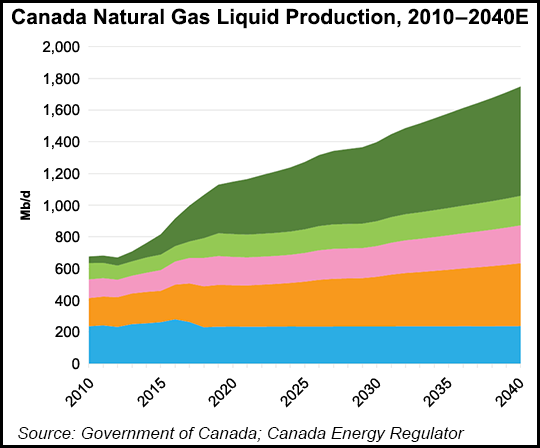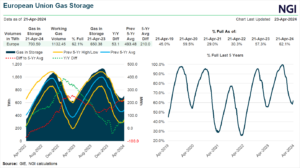Infrastructure | NGI All News Access | NGI The Weekly Gas Market Report
Alberta Seeks New Petrochemical Plants to Work Montney, Duvernay Natural Gas Production

The Alberta government posted a reward Thursday for petrochemical manufacturers to build new plants that draw their raw materials from natural gas produced in the province.
Natural Gas Minister Dale Nally announced a 10-year grant fund titled the Alberta Petrochemicals Incentive Program. The dollar value and eligibility rules were left open to negotiation, with further announcements to come this fall.
The government predicted the petrochemical project reward would become a strong element of a C$10 billion ($7.5 billion) provincial treasury commitment to drive economic recovery from the Covid-19 virus pandemic.
Nally said, “With our affordable 300-year supply of natural gas, technically skilled and educated workforce, and respected innovation and research sectors, Alberta is ready to seize the opportunity to become a global destination for petrochemical manufacturing.”
While no industry takers immediately stepped forward for the Alberta government petrochemical reward, three contenders for project aid are well known.
Inter Pipeline Ltd. is building a C$3.5 billion ($2.6 billion) plant to make 525,000 tons of polypropylene per year from 22,000 b/d of propane near Edmonton.
Also near Alberta’s capital city, Pembina Pipeline Corp. was poised to start construction on a similar C$4.5-billion ($3.4-billion) project until the COVID-19 pandemic prompted corporate budget cuts.
Nauticol Energy, a private Calgary firm led by industry and finance veterans, has proposed a C$2 billion ($1.5 billion) methanol plant northwest of Edmonton near Grande Prairie.
All the petrochemical projects would use raw materials derived from production of liquids-rich shale gas deposits in the Montney and Duvernay geological formations that straddle Alberta and British Columbia.
The new grants enrich a previous government petrochemical aid scheme that was limited to awarding credits against provincial royalties to project sponsors, for them to give to gas producers in exchange for supply commitments.
The Alberta government showed willingness to provide large-scale industry aid in March, with a C$7.5 billion ($5.3 billion) grant and loan guarantee package to cover TC Energy Corp.’s costs for Canadian sections of the Keystone XL oil pipeline project.
Construction is under way in Alberta and Saskatchewan. Alberta Premier Jason Kenney acknowledges risks associated with the 1,688 kilometer (1,013 mile) United States leg of Keystone XL but holds out hope of rescuing the 830,000-barrels-daily export proposal from public protest, regulatory and court setbacks, and declared opposition by Democratic Party presidential Candidate Joe Biden.
The new petrochemical project reward will enable Alberta to catch an industrial wave stirred up by Covid-19, predicts the provincial government.
“The current global health crisis has highlighted the importance of petrochemical manufacturing around the world,” says the program announcement.
“Petrochemical facilities make the building blocks required for everyday consumer and professional items like medical equipment, computers and cellphones, personal protective equipment like rubber gloves and masks, car seats and tires, and fertilizer for agriculture and home gardening.”
© 2024 Natural Gas Intelligence. All rights reserved.
ISSN © 2577-9877 | ISSN © 1532-1266 | ISSN © 2158-8023 |


